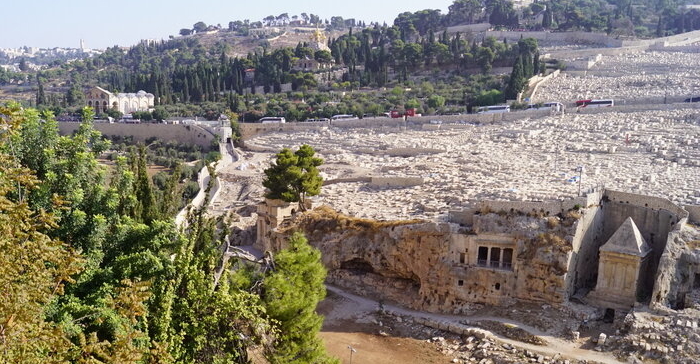IN SEARCH OF KINGSHIP
by Roger Wyatt | 14th December 2020 | more posts on
'Messianic hope in the Hebrew Bible'| 0

Photograph: Roger Wyatt. Looking out over the Kidron Valley towards the Garden of Gethsemane and the Mount of Olives. Possible location of the ‘King’s Valley’.
The end of pre-monarchic Israel coincides with the end of the book of Judges and the beginning of 1 Samuel. The ageing prophet had failed to see that the political life of Israel was about to dramatically change and appointed his own two sons Joel and Abijah as his successors, serving at Beersheba. Predictably, they were unfit for the role and ‘did not follow his ways. They turned aside after dishonest gain and accepted bribes and perverted justice’ (1 Samuel 8:3 NIV). Not only had the institution of the Judges seemingly failed, the priesthood of Eli at Shiloh had also fallen into disrepute. Again, fault lay not so much with Eli as with his wicked sons who ‘had no regard for the LORD’ (1 Samuel 2:17 NIV). Any future semblance of civil or spiritual governance seemed lacking and ‘all the elders of Israel gathered together and came to Samuel at Ramah’ (1 Samuel 8:4 NIV). The reason for the gathering soon becomes apparent and the request straightforward: ‘now appoint a king to lead us, such as all the other nations have’ (1 Samuel 8:5 NIV). It is a request that displeases both Samuel and the LORD.
It is a genuine surprise that Samuel seems blinded to the coming request as the book of the Law had explicitly stated that the day would come; seven verses in the book of Deuteronomy are dedicated to the matter:
‘When you enter the land the Lord your God is giving you and have taken possession of it and settled in it, and you say, “Let us set a king over us like all the nations around us,” be sure to appoint over you a king the Lord your God chooses.’ (Deuteronomy 17:14-15a NIV)
The instructions continue to direct the future king, מֶלֶךְ (melek), to not take too many wives and to not accumulate large amounts of silver and gold – precepts destined to be broken. More importantly perhaps the king is requested to write out a copy of the Law for himself and to read it ‘all the days of his life’ (Deuteronomy 17:19 NIV); the future kings of Israel were to be different from those of the surrounding nations in this respect. Sadly however, very few of the monarchs of Israel would judge it important to follow God’s directive given through Moses in the kingdom of Moab. Moreover, despite the Pentateuchal expectation that the Israelites would behave so, the request for a king angers God and as far as Samuel is concerned it is a snub to God’s divine kingship. As if to affirm this, after Samuel prays to God out of his own displeasure the LORD replies: “Listen to all that the people are saying to you; it is not you they have rejected, but they have rejected me as their king’ (1 Samuel 8:7 NIV). The reactions of both God and Samuel alike are difficult to understand, at least on first consideration; ostensibly, nowhere in the text of the Hebrew bible, up until this point, had God directly revealed himself as king to the Israelites. And so, there can be no other conclusion, it must be the case that at some unexplained point in their history, as far as the Israelites were concerned, God had made it abundantly clear that he was their true king, and it now follows that they were rejecting him at Ramah.
That there is an absence of revelation concerning God as the true king of Israel prior to 1 Samuel is however, not entirely true. As early as Genesis 14 the Torah cryptically references divine kingship. Although shrouded in speculation and mystery after Abram rescues Lot, he is met my Melchizedek, king of Salem, מַלְכִּי־צֶדֶק (malki-tsedeq lit. my king is right). The whole passage draws a sharp comparison between Abram and the kings who held sway in the Near East. Whilst the kings who were allied with the king of Sodom were unable to defeat those marching with Kedorlaomer, the king of Elam, Abram pursues those who had taken his nephew Lot captive and defeats the Elamites with just a few hundred men. The king of Sodom, who has inadvertently benefitted through Abram’s intervention, goes out to meet Abram in the ‘Valley of Shaveh (that is, the King’s Valley)’ (Genesis 14:17). Whilst Abram’s discourse with the king of Sodom is of interest, it is the presence of the mysterious Melchizedek that has firmly kept the passage as the source of endless interest and speculation. There is however, in my opinion, a messianic simplicity to the scene and the gift of bread and wine to Abram is an act filled with sacramental overtones. Moreover, this is not just a king of righteousness, but a priestly king of peace (salem). The messianic superlatives continue as Abram gives a tithe to Melchizedek and as the ‘priest of God Most High’ (Genesis 14:18) he releases a heavenly blessing over the yet to be renamed Abram. In the end it is Abram who acts in a kingly, almost Davidic manner, refusing the spoils of the king of Sodom with the words ‘I will accept nothing belonging to you, not even a thread or the strap of a sandal, so that you will never be able to say, “I made Abram rich”’ (Genesis 14:23). The proximity of the encounter to Jerusalem and the motif of righteous kingship, along with the association of peace fills the text with an unparalleled messianic force and it would not be a theological stretch to conclude that Abram had met none other than God himself, the true king, in the valley of the king.
Melchizedek is not the only mysterious king in the Torah. In the book of Numbers, Balak the king of Moab is concerned at the number of the oncoming, warring Israelites and seeks to employ a master of divination, known as Balaam, to curse the descendants of Jacob. However, it is something Balaam is unable to do: ‘I have received a command to bless; he has blessed, and I cannot change it’ (Number 23:20 NIV). The reality of the Abrahamic blessing over God’s people is once again in evidence and Balaam continues to explain to the no doubt frustrated Balak:
‘“No misfortune is seen in Jacob,
no misery observed in Israel.
The Lord their God is with them;
the shout of the King is among them.”’ (Numbers 23:21)
The phrase וּתְרוּעַת מֶלֶךְ בּֽוֹ (uteruat meleḵ bo lit. and the shout of a king among them) is a curious one to say the least, however, the shout, is most probably a war cry; the suggestion is perhaps that Balaam is poetically explaining that the military successes of Israel are in some way attributed to an unnamed warrior king. It is the presence of this ordinarily undeclared king in the camp of the wandering Israelites that is intriguing and begs the question, ‘who is this king and when did he take up his kingship?’ The reference to a king’s presence with the Israelites is in fact not an isolated occurrence. In the book of Deuteronomy, as Moses nears the time of his death, he speaks out a blessing over the tribes of Israel: ‘This is the blessing that Moses the man of God pronounced on the Israelites before his death’ (Deuteronomy 33:2 NIV). The blessing declares that ‘The LORD came from Sinai and dawned over them from Seir’ (Deuteronomy 33:2 NIV), and unambiguously states in verse five that this LORD was also king: ‘He was king over Jeshurun when the leaders of the people assembled, along with the tribes of Israel’ (Deuteronomy 33:5 NIV). Jeshurun יְשֻׁרוּן, is an Old Testament name for Israel derived from יָשַׁר (yashar), meaning to be ‘straight’ or ‘right’; the motif of kingship with righteousness seems implied - this is a righteous king who will bring forth a righteous people. There can be no other conclusion, Yahweh is revealed as king at Sinai.
Taken together, the scriptures studied above reveal something of the presence of a divine, righteous king in the Pentateuch who made himself known to both Abram, the Israelites at Sinai and to an obscure prophet in Moab. But more than that, this king would not be absent from the people he would rule, he would be a king of peace who would accompany his people as they journeyed into battle against the kings of the lands they would enter. Indeed, there is only one clear point at which a heavenly character joins the Israelites, and it is delineated in Exodus 23:
‘“See, I am sending an angel ahead of you to guard you along the way and to bring you to the place I have prepared. Pay attention to him and listen to what he says. Do not rebel against him; he will not forgive your rebellion, since my Name is in him.”’ (Exodus 23:20-21 NIV)
The text literally reads כִּֽי־יֵלֵךְ מַלְאָכִי לְפָנֶיךָ (ki-yeleḵ malaḵi lep̄aneḵa lit. for will go my angel before your face), and It seems apparent that the mysterious angel of Exodus 23, who would not just accompany, but lead the Israelites was none other than God himself. Moreover, with all these things considered, it seems that the rejection of Yahweh as king had in fact taken place long before the elders of Israel approach Samuel at Ramah; Judges 17:6, 18:1, 19:1, 21:25 states plainly, ‘there was not king in Israel’, and 21:25 emphatically adds ‘everyone did as they saw fit’. And so, it must be understood that the events unfolding at the end of Samuel’s life were a mere precipitation of a state of affairs that had long persisted in Israel, the rejection of the rule of the true king revealed to the descendants of Abraham at Sinai.
